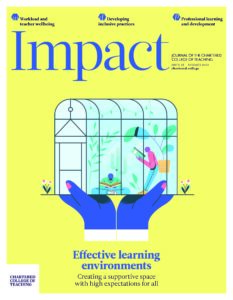Growth mindset and brain plasticity – the neuroscientific underpinnings of learning
Written by: David Bowman

7 min read
David Bowman, Teacher of Mathematics, GLOW Maths hub, UK
The article ‘Mistakes, mindsets and mathematics’ (Bowman, 2018) discussed the four academic mindsets (Farrington et al., 2012) that are the core of the ‘YesUCan’ message (Figure 1). ‘YesUCan’ is a belief that, with effort and great teaching, it is possible to improve in all things. It develops a culture where everyone expects to be better today than they were yesterday. This article revisits these mindsets and discusses brain plasticity, which is the biological basis for a growth mindset.
Figure 1: Diagrammatic representation of YesUCan
As depicted in Figure 1, there are four academic mindsets identified by Farrington et al. (2012) that have a significant impact on whether learning takes place. A great amount has been written about growth mindset (Dweck, 2008), much of it questioning the validity of studies and its benefits to students’ learning. Examples include Fletcher-Wood (2022), Li and
Join us or sign in now to view the rest of this page
You're viewing this site as a guest, which only allows you to view a limited amount of content.
To view this page and get access to all our resources, join the Chartered College of Teaching (it's free for trainee teachers and half price for ECTs) or log in if you're already a member.
- Blakemore S-J and Frith U (2005) The Learning Brain: Lessons for Education. Oxford: Blackwell Publishing.
- Bowman D (2018) Mistakes, mindsets and mathematics. Impact 3. Available at: https://my.chartered.college/impact_article/mistakes-mindsets-and-mathematics (accessed 13 December 2021).
- Chivers T (2019) The myth of the growth mindset. In: Nomanis. Available at: www.nomanis.com.au/single-post/the-myth-of-the-growth-mindset (accessed 7 March 2022).
- Conyers M and Wilson D (2020) Believing in the brain. Educational Leadership 77(8): 22–27.
- Dweck C (2006) Mindset: The New Psychology Of Success. New York: Ballantine Books.
- Farrington C, Roderick M, Allensworth E et al. (2012) The role of noncognitive factors in shaping school performance: A critical literature review. University of Chicago Consortium on Chicago School Research. Available at: https://files.eric.ed.gov/fulltext/ED542543.pdf (accessed 11 March 2022).
- Fletcher-Wood H (2022) Is growth mindset real? New evidence, new conclusions. In: Improving Teaching. Available at: https://improvingteaching.co.uk/2022/03/06/is-growth-mindset-real-new-evidence-new-conclusions (accessed 7 March 2022).
- Foliano F, Rolfe H, Buzzeo J et al (2019). Changing mindsets: Effectiveness trial. Education Endowment Foundation. Available at: www.niesr.ac.uk/wp-content/uploads/2021/10/Changing-Mindsets_0-4.pdf (accessed 13 December 2021).
- Li Y and Bates TC (2019) You can’t change your basic ability but you work hard and that’s how you get hard things done. Journal of Experimental Psychology 148(9): 1640–1655.
- Porter T, Molina DC, Cimpian A et al. (2021) Growth mindset intervention delivered by teachers boosts achievement in early adolescents. Psychological Science. Available at: www.researchgate.net/publication/355165738_Growth_Mindset_Intervention_Delivered_by_Teachers_Boosts_Achievement_in_Early_Adolescence (accessed 13 December 2021).
5
2
votes
Please Rate this content
Please login to comment
0 Comments
Oldest
Newest
Most Voted
Inline Feedbacks
View all comments










